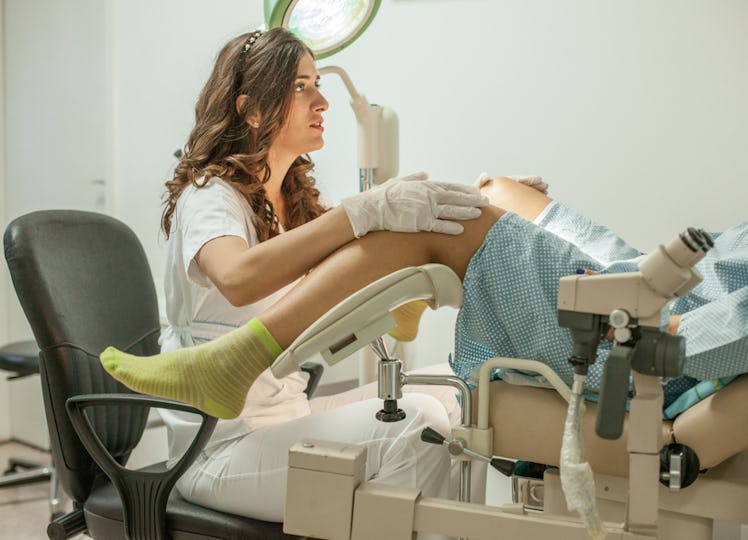
This Is How Often You Should Get Tested For STDs To Stay As Safe As Possible
I attended all-girls Catholic school for many, many painful years of my life. Naturally, my religious studies teacher at the time was also trusted with the title of biology teacher, which gave her free rein to teach us all that boys were gross and sex would kill us. That's it. Nothing else to learn here, kids. There was no talk about how often you should get tested for STDs or why safe sex was about more than just avoiding an unwanted pregnancy. For the record, getting pregnant at my high school meant immediate expulsion for students and something horrifyingly similar for unmarried female teachers. Yay for the patriarchy.
Anyway! The point is there's a lot I didn't learn in school about my sexual health, rights, and responsibilities (besides keeping my chastity belt on nice and tight, of course). As an adult, I've made a conscious effort to take control of my sexual health, which, I have to admit, makes me feel more confident in the dating world. I get tested regularly so that I'm safe but also because I enjoy being able to confidently communicate this with any new partners.
In fact, sharing my own status is usually how I start the conversation about whether or not they have been tested recently. And BTW, you should always ask your sexual partners if they've been tested, how long ago they were tested, and whether or not they received any positive test results. They may not know their current status or choose not to share this with you.
To make sure we're all the same page here, I asked Dr. Cindy Duke, OB-GYN and medical director of the Nevada Fertility Institute, how often you should get tested and here's what she had to say.
You should get tested before hooking up with every new sexual partner.
Here's why. According to the CDC, in 2016, more than two million cases of chlamydia, gonorrhea, and syphilis were reported. That's the highest number ever! If that's not incentive enough to get tested, then maybe this will be.
Dr. Duke says you should get tested with every. new. sexual. partner. No, that doesn't mean you need go to your local Planned Parenthood health center together (although you can). It just means that you should get tested before engaging in sexual activity with someone for the first time. It's a good way to to keep yourself safe and to avoid contaminating future partners. Imagine if everyone did this!
She also recommends getting tested regularly even if you're in a monogamous relationship. If you sense that your partner is not always honest with you or that they might be cheating on you, you should definitely take it upon yourself to check up on your sexual health.
In the case of herpes and HPV, you don't even have to have sex to be infected so it's also important to get tested if you notice any unusual symptoms (cold sores on or around your mouth, or lesions on your genitals along with flu-like symptoms). Although you can’t get herpes from holding hands, coughing, sneezing, or sitting on a toilet seat, you can get it from kissing or prolonged skin-to-skin contact. Knowledge really is power in this instance.
You can get tested as early as 48 hours to one week after you have sex with someone new.
One of the worst feelings in the world is the anxiety you have while waiting to be tested or to receive your results if you think you've been infected. The sooner you can get clarity on this, the better.
Lucky for you, Dr. Duke says, "Infections such as trichomoniasis [or trich], which is not a bacteria or virus, can usually be seen under a microscope in as little as 48 hours. Plus, the patient will show signs of foul-smelling and discolored vaginal discharge or penis discharge within a few days."
Unfortunately, for other STIs, the wait is a little longer. "It can take up to a week before bacterial infections such as syphilis, gonorrhea, and chlamydia show up positive on a test. And viral infections such as HIV, herpes and hepatitis can take as little as two weeks and up to three months to reveal positive test results," she explains.
So basically, if you're having sex with multiple partners, you should probably be getting tested at least every three months.
Getting tested regularly can help you avoid life-altering health problems in the future.
I know getting tested is scary but it's the first step to getting treated if you do find out you're infected. Putting it off only makes things worse. Just ask Dr. Duke.
"If left untreated, many STDs can cause permanent and life-threatening damage such as sepsis, arthritis, dementia (from syphilis), pain, and infertility. In fact, one third of women with infertility have tubal blockage, which is primarily caused by infection with chlamydia," she tells Elite Daily.
Even if your diagnosis is lifelong (like with HIV, HPV, or herpes), you can still maintain a healthy sex life with the help of a medical professional, which is why you should definitely get tested to know for sure.
For more information about getting tested, you can contact your local Planned Parenthood health center, your campus clinic, or your private physician to schedule an appointment. Don't wait until it's too late.